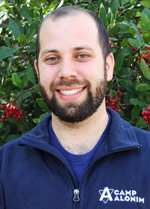By Aaron Goldberg

LOS ANGELES — All year long we wait for summer.
This is especially true for children and teens who can’t wait to return to summer camp, where they meet lifelong friends, discover themselves, and become part of a welcoming Jewish community. For many, camp is their first experience being away from home for an extended period, a crucial time in one’s development, not only as a member of the Jewish community but as an individual.
For 67 years, we have been incredibly proud to provide this experience at Camp Alonim, part of the American Jewish University. This summer, our dedicated team determined that we had to do something intentional, creative, and meaningful in response to the COVID-19 pandemic, which shut down summer camps across the country. With safety being the highest priority, we would not be able to gather in person for our traditional camp experience. We set out to reimagine what the camp experience and camp community would look like during this very different summer.
One of the most powerful ideas in Judaism, a notion born out of the creation story, is that of creating order out of chaos. At Camp Alonim, we drew inspiration from this age-old Jewish wisdom, and adapted it to our world today to continue building community during a time of chaos.
For the first time in our history, we offered campers virtual sessions at no cost. This summer our staff and counselors were volunteers, donating their time to facilitate online events and programs, prepare on-campus family activities, stay in touch with campers, and help cultivate our wider community.
Zoom events and online content reached current campers, staff, alumni, and the greater Alonim community. We implemented daily virtual programming for the campers ranging from electives like Israeli dancing and cooking, to community campfires, to Judaic programming, creating a space for campers of the same age to spend some much-needed time together.
We also organized multiple Shabbat-Dinners-To-Go, providing the opportunity to visit Camp Alonim and grab a quintessential camp meal, with safety measures in place, for families to take back home and enjoy together. Even if only for a few short minutes, these families were able to drive down Peppertree Lane and see our year-round team, dressed in white for Shabbat, delivering meals to cars. When the campers and their families would later gather on our Zoom camp Shabbat—with some families even surprising their children with this special meal—the experience felt bigger than something contained behind a screen.
To take the experience one step further, we offered Alonim Adventures, a family day trip to the Brandeis Bardin Campus. I saw the faces of families light up as they rode on horseback through our beautiful property, practiced teambuilding activities on our low ropes course, visited our animals, tried their hand at archery, and went swimming together. We were delighted to be able to provide these activities for families, while adhering to social distancing and safety protocols.
All of these experiences together culminated in a deep sense of both belonging and nostalgia for the Camp Alonim community. They also invited alumni, whether recent or from decades past, back into our community—a community that is always present, even when we may not be physically together.
Hundreds of friendly faces joined us on screen for a variety of community programs. Several times throughout the summer, current campers, parents, alumni (some with campers of their own), and staff came together to celebrate Shabbat and to usher in a new week with Havdalah experiences. Familiar songs were sung, dances were danced, past camp memories were recalled, and the nostalgia and love for the Alonim community was palpable. This summer also provided the opportunity for new connections, as 22 alumni (CITs of 1965) joined together virtually for their first reunion since that summer at camp. It became increasingly clear over the course of the summer that the Alonim community is strong across multiple generations and time zones. This summer proved to us that you do not have to be at Alonim to be an Alonimer.
During this challenging time, our communities can be a source of strength and warmth. As we look to the future, I am confident that our vibrant Camp Alonim community will remain connected, will harness Jewish values to guide us forward, and will continue to find ways to keep the magic of camp alive.
*
Aaron Goldberg is the Director of Camp Alonim of American Jewish University.